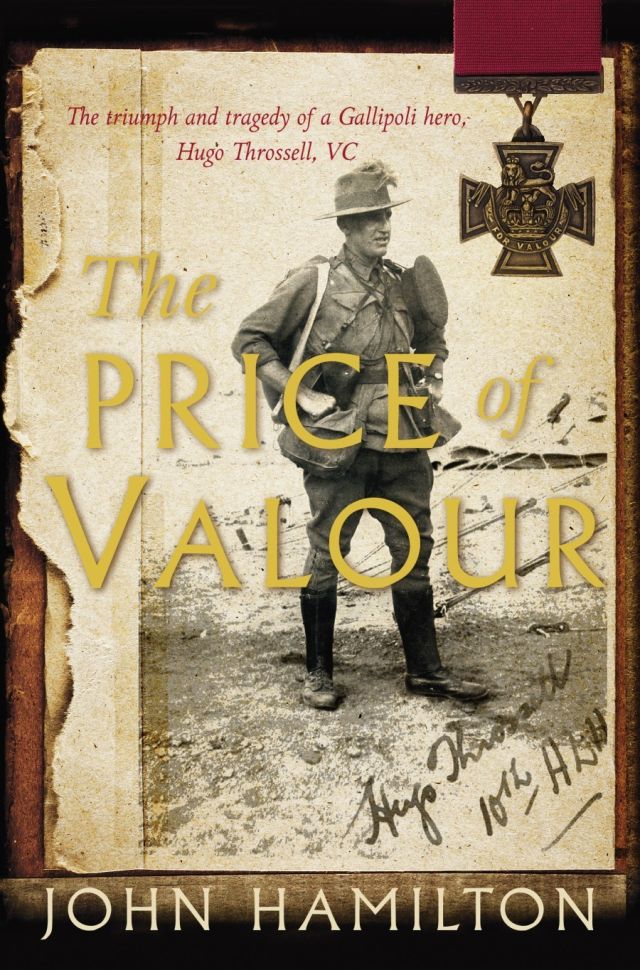
The Price of Valour: The Triumph & Tragedy of a Gallipoli Hero, Hugo Throssell, VC
John Hamilton
Pan Macmillan, 2012
393 pages, $34.99 (pb)
Captain Hugo Throssell, one of nine Australian soldiers to win a Victoria Cross for supreme bravery at Gallipoli in 1915, stunned his home-town audience of patriotic Australians in 1919 with his statement that “the war has made me a socialist”.
The declaration, made on the anniversary of the signing of the Allies' World War I peace treaty with Germany, made headlines. It also made enemies, says John Hamilton in his biography of Throssell.
The civic authorities of the town of Northam in Western Australia listened with increasing disbelief as Northam’s own war hero denounced war for enriching armaments makers, war profiteers and rival national capitalist classes in their competition for territory, markets, resources and profits.
Throssell had been a dashing cavalry officer who, in the first flush of battle, wrote how it was “most glorious” to see a bayonet charge and what a “wonderful thing” it was to see men running through an artillery bombardment. But he became war-weary and disillusioned after seeing his mates killed and after suffering severe mental injury.
With what would now be diagnosed as post-traumatic stress disorder, Throssell’s days were filled with nervousness and headaches due to a head wound. His nights were tortured into sleeplessness by what he had seen at Gallipoli and by the death of his brother who had signed up with Throssell in the belief that war was a thrilling adventure.
Throssell, the privileged son of a conservative state premier, married Katherine Susannah Prichard, the journalist and feminist who went on to fame as a novelist and founder of the Communist Party of Australia.
Prichard’s communism, and her profound love for a handsome, vital, selfless man, helped Throssell make sense of his ghastly war experiences.
Reading Engels may not have been easy — “Hell, girl, what the blazes does this mean?” he would holler — but “usually our political discussions ended in love-making,” wrote Prichard.
Throssell, without becoming a party member, accepted Prichard’s political views as his own.
Australia’s political police put Throssell’s radicalisation down to “his wife’s influence”, or “his mind perhaps having been affected” by the cerebro-spinal meningitis he contracted during the war.
Throssell’s biographer hedges his bets, saying it is possible that the brain injury Throssell received from a botched, war-time sinus operation made him “more vulnerable and easily influenced”.
Socialism, apparently, can only be understood as a psychological disorder, the product of a weakened mind.
Throssell, however, knew his own mind — on the back of his will he wrote “I have never recovered from my 1914-18 experiences”, shortly before committing suicide using his army pistol in 1933.
He also added an appeal that “my wife and child get the usual war pension”. Owing £10,000 with just £10 in the bank, Throssell’s financial disasters during the Great Depression had been exacerbated, writes Hamilton, by his “enemies at work within the government”.
These enemies helped ensure his economic projects were costly failures. Conservatives in the Northam Returned Soldiers and Sailors League also got the government to remove Throssell from his job as soldiers’ representative on the government’s Discharged Soldiers’ Settlement Board.
The Repatriation Department added insult to tragedy by disputing the coroner’s finding that Throssell’s war wounds were the cause of his suicide.
Prichard angrily defended her husband who “believed he would be ensuring a pension to me and my son by his last act. I consider that his 'grateful country' made it impossible for my husband to live. He thought he had to die to provide for his wife and child.”
It was not until 1999 that a “modest memorial the size of a backyard barbecue” was erected to Throssell in Northam by his “grateful country”.
During the depression, Throssell had been forced to try to pawn his Victoria Cross but was offered only 10 shillings for it — the “price of valour” for a war hero who had, as his son Ric said later when donating Throssell’s medal to People for Nuclear Disarmament, “declared his commitment to peace”.
Throssell has not been well served by official history, nor by his biographer. Hamilton's conventional war narrative focuses on Throssell the warrior, not the socialist.
Hamiltion's biography includes a disapproval of Throssell’s decision to choose a patriotic occasion of military celebration to denounce war. “Not the time nor place,” says Hamilton — but what better time or place could there be? It took political courage and Throssell had just as much of that as he had bravery on the battlefield.
